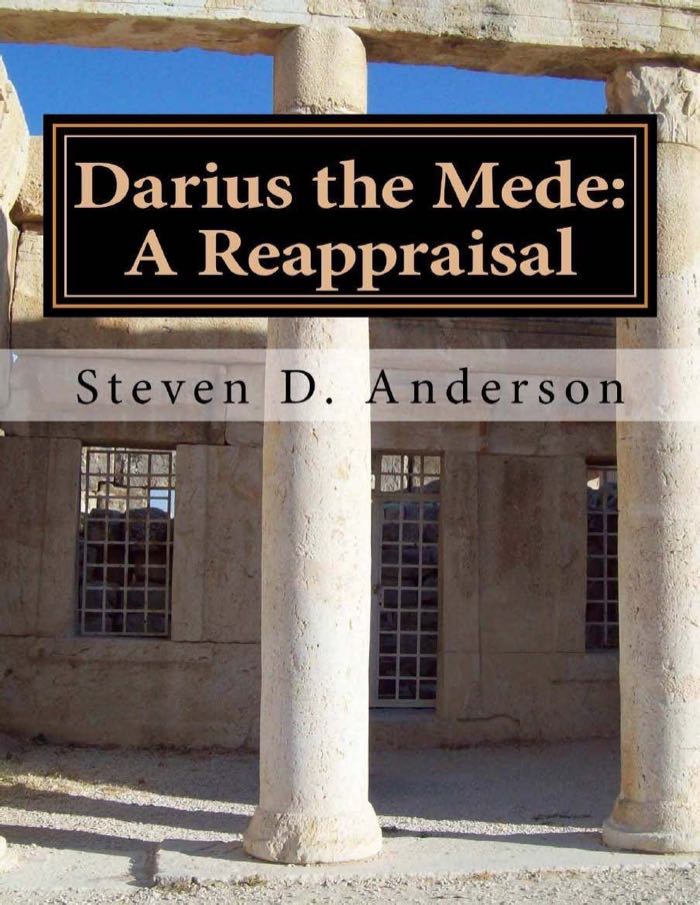Darius the Mede: A Reappraisal
Reviewed date: 2023 Mar 12
172 pages
Dr. Steven D. Anderson makes a case for identifying Cyaxares II with Daniel's Darius the Mede. I found it refreshing that this book is written from an unapologetically Christian perspective. Anderson makes no apology for considering the Bible to be the true word of God. He also makes a strong case for the historicity and authenticity of the book of Daniel from the archeological and historical evidence.
Links
(Paperback) Book at Amazon: Darius the Mede: A Reappraisal
(PDF) Academia.edu: Darius the Mede: A Reappraisal
(PDF) Academia.edu (Dissertation version): Darius the Mede: A Reappraisal
For something more brief try this nine-page summary:
(PDF) Academia.edu: The Identifications of Darius the Mede
A summary of the case
We have no records from the Medes, and only a few from the Persians. Thus the primary sources are two Greek historians: Herodotus and Xenophon. Their accounts conflict and are mutually exclusive. Herodotus's account has Cyrus overthrowing the Median king Astyages and seizing control of the entire Medo-Persian empire prior to conquering Babylon, and therefore does not allow for the existence of Darius the Mede as described in the book of Daniel. Xenophon's account says Cyrus (king of the Persians) was coregent with the Median king Cyaxares II (son of Astyages) when the Medo-Persian army conquered Babylon. As senior coregent Cyaxares II was official head of the Medo-Persian alliance until his death two years later, at which point Cyrus inherited the Median throne and became the sole ruler. Daniel's Darius the Mede could be a throne name of Cyaxares II. The few Persian sources we do have support Herodotus's version: that Cyrus overthrew the Median king Astyages (who had no son) prior to conquering Babylon.
Anderson makes a case that those Persian records are all propaganda texts from Cyrus. Anderson points to a few other pieces of information from other historical sources that support Xenophon's version of events, including two that mention Darius by name. He suggests these are better and more trustworthy sources because there is no obvious reason for them to be propaganda like the Persian sources.
Is it convincing?
I found it convincing. I'm an amateur, but Dr. Anderson's explanation makes more sense than other theories I've heard, such as that Darius was the regnal name of an appointed governor (Gubaru/Ugbaru) of Babylon. Dr. Anderson points out that the identification of Darius the Mede with Cyaxares II was the predominant view for centuries, and only fell out of favor when the Persian sources that agree with Herodotus were discovered in the 1880s. But when the Persian sources are understood as Cyrus propaganda, Xenophon's version of events is more trustworthy that Herodotus's, and the details of Cyaxares II line up with Daniel's description of Darius the Mede.
But like I said, I'm an amateur. Dr. Anderson's theory sounds good to me but I have no frame of reference or knowledge that makes me qualified to judge his work. So for now I'll adopt his theory, but I'll hold it loosely. I hold tightly to the inspiration and truth of the Bible and the book of Daniel, but when it comes to piecing together a chronology of ancient Median kings from fragmentary records? I'll hold those opinions loosely.
Acceptance
Evangelical Christians seem to be picking up and adopting Dr. Anderson's theory, although Tom Finley at the Biola Talbot School of Theology is not convinced, preferring instead the theory that Darius is another name for Cyrus. The critical scholars (it seems) have paid no attention to Dr. Anderson's work. The only other detailed review of Anderson's work that I've found comes from a Muslim blogger, whose objections don't seem (to me) to be carefully considering Anderson's work.
